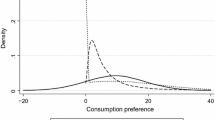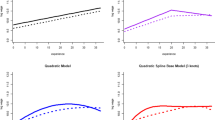Abstract.
This paper expands the standard analysis of female labor supply to permit preference heterogeneity by using a finite mixture model. Using the extended model, we obtain theory consistent results whereas a traditional model produces a negative substitution effect. We use our model to illustrate the labor supply effects of a tax reform, corresponding to 1983–1992 changes in the Swedish income-tax schedule. The results shows an expected reduction in tax revenues of about 17%. Finally, we use Monte Carlo simulations and show that our proposed mixture model is robust towards different misspecifications.
Similar content being viewed by others
Author information
Authors and Affiliations
Additional information
First version received: March 1998/final version accepted: October 1999
Rights and permissions
About this article
Cite this article
Ericson, P., Hansen, J. Assessing the impact of taxes on female labor supply using a finite mixture approach. Empirical Economics 25, 279–296 (2000). https://doi.org/10.1007/s001819900017
Issue Date:
DOI: https://doi.org/10.1007/s001819900017




